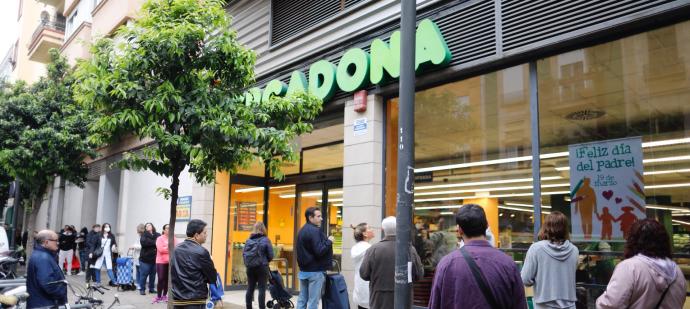 Shoppers in Spain have been buying more alcohol since the Spanish government declared a state of alarm. The sale of beer rose by 77.65% with respect to the previous week, while wine jumped by 62.7% and alcoholic drinks by 36.58%, according to a study in the consumer magazine Inforetail, which is supported by the Spanish Association of Distributors, Self-Service Stores and Supermarkets (Asedas).
Shoppers in Spain have been buying more alcohol since the Spanish government declared a state of alarm. The sale of beer rose by 77.65% with respect to the previous week, while wine jumped by 62.7% and alcoholic drinks by 36.58%, according to a study in the consumer magazine Inforetail, which is supported by the Spanish Association of Distributors, Self-Service Stores and Supermarkets (Asedas).
The study also shows that the large purchases seen in the lead up to the lockdown eased during the first two weeks of confinement. The peak of the shopping frenzy was reached between March 11 and 14, just before Prime Minister Pedro Sánchez announced the state of alarm.
“In these two weeks, the number of visits made by each shopper has dropped and the size of each individual purchase has increased slightly, in accordance with the recommendations of the health authorities. These shopping purchases reflect the lockdown the Spanish population is under,” says Felipe Medina, the secretary-general of Asedas, which represents the main businesses in the supermarket sector as well as 19,100 establishments.
While the demand for toilet paper has stabilized, other products have seen a spectacular rise in sales, such as olives (+93.83%), potato chips (+87.13%), chocolate (+79.04%), ice cream (+76.19%) and anchovies (+60%). What’s more, according to figures from the Ministry of Agriculture, Fisheries and Food, the sale of flour has shot up by 196% with respect to the previous week. It would appear that people have decided that the best way to cope with the lockdown conditions is to set up a bar and a cake shop at home.
But what is behind this change in shopping habits? Is there a sociological or psychological explanation for it?
According to Carmelo Vázquez, professor of psychopathology at Madrid’s Complutense University, “this reflects the ability to give ourselves rewards and treats in these times.” After the 2001 September 11 terrorist attack on New York and the 2004 Madrid train bombings, Vázquez completed numerous studies on the post-traumatic stress experienced by people in those cities in the aftermath of the attacks. According to the professor, these two events, in spite of the obvious differences, bear a certain similarity to what is currently happening.
“Despite the widespread thinking that everything is going badly, people are extraordinarily resilient,” says Vázquez. “Back then, the studies showed us that the level of post-traumatic stress did not reach 7%. Now there is a lot of preparatory alarm, but people are handling it very well. One of the phases is exactly that: drink beer, alcohol and eat potato chips. This has a therapeutic effect. The consumption of alcohol and candy increases endorphins, which happens in high moments of stress.”
Olga Castanyer is a specialist in clinical psychologist and author, she says she also “meets up to have some beers with friends on Skype.” According to Castanyer, demand for beer has soared in the past two weeks due to the high levels of stress about the coronavirus crisis. “You don’t eat steak when you are stressed. What the body wants is sugar and fat,” she explains. “When we are locked up, our brains ask us for a prize: like chocolate, candy or simply beer. We are used to living according to certain paradigms and we have never seen the one we are in. That’s why it’s good to continue the social customs of before: glass of wine at home, olives, the Mediterranean culture.”
It’s a theory that’s backed by Josep Lobera, a sociologist at the Autonomous University of Madrid. “You have to take a good look at the data. The consumption of lime flower tea and chocolate reduces anxiety. Others manage it with alcohol or video games. They are all different forms of escape,” he explains. Supermarket cashiers say they have also noticed that more people are buying alcohol.
Have your shopping habits changed?
Please tick up to 5 products that you are now buying more of...